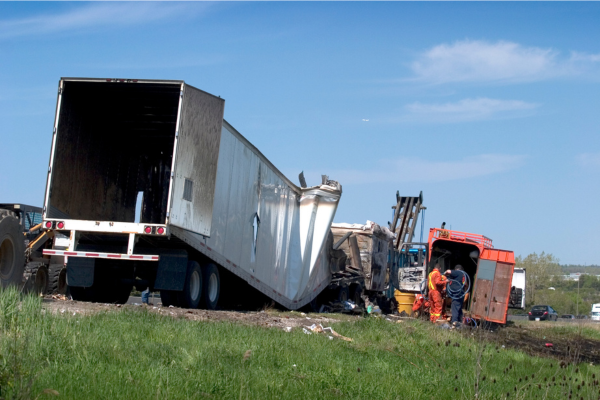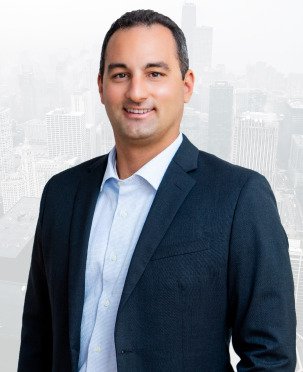
A trucking collision case differs from a standard motor vehicle collision case in various ways. We’ll explore how these two kinds of accidents differ.
Size and Weight of Trucks
One of the most apparent differences between a trucking collision and a standard auto accident is the size and weight of the vehicles involved. A fully loaded commercial truck can weigh as much as 80,000 pounds, while a passenger vehicle typically weighs 3,000 to 4,000 pounds. The huge disparity in weight often results in far more severe consequences in the event of a collision, both in terms of damage to the vehicles and injuries to passengers. Trucks require longer stopping distances and have larger blind spots, which increases the risk of serious accidents.
The sheer size of trucks also means that the forces involved in a collision are much higher, often resulting in catastrophic damage to smaller vehicles. Victims in trucking collisions are more likely to suffer severe injuries or fatalities compared to those in typical car accidents. The heightened severity increases the stakes for both the plaintiffs and the defendants involved in the case.
Commercial and Federal Regulations
The trucking industry is highly regulated, and this regulatory framework adds a layer of complexity to any legal case involving a truck collision. The Federal Motor Carrier Safety Administration (FMCSA) imposes specific rules on truck drivers and trucking companies. These regulations cover areas such as:
- Hours of Service (HOS): Truck drivers are limited in the number of hours they can drive without rest. This aims to prevent fatigued driving, a common factor in trucking accidents.
- Vehicle Maintenance: Trucking companies are required to ensure that their fleets are properly maintained. This includes routine checks and repairs on brakes, tires, and other essential components.
- Driver Qualifications: Truck drivers must meet specific licensing and training requirements to ensure they are qualified to operate heavy vehicles safely.
- Electronic Logging Devices (ELDs): ELDs track drivers’ hours to ensure compliance with HOS regulations. These devices often play a crucial part in determining liability in accidents where driver fatigue is suspected.
In standard vehicle collisions, the drivers are typically only subject to local traffic laws. In contrast, trucking collisions require an understanding of both state and federal regulations and the ability to interpret technical data from logs and other sources.
Multiple Parties Involved
In a typical car accident, two parties are usually involved: the vehicles’ drivers. In trucking collisions, however, multiple parties can often be held liable. These may include:
- The Truck Driver: If the driver violated traffic laws, failed to follow safety protocols, or was driving while fatigued, they could be held liable.
- The Trucking Company: The company that employs the driver may also be responsible if it pushes the driver to exceed HOS regulations or fails to maintain the vehicle properly.
- The Cargo Loaders: Improperly loaded or secured cargo can lead to accidents, particularly if the load shifts during transit.
The involvement of multiple parties complicates determining liability, as an in-depth investigation into each party’s role in the collision is required.
Insurance Coverage
Trucking companies are required to carry significantly higher amounts of insurance coverage than the average driver. A commercial trucking policy often has coverage limits in the millions of dollars, while standard car insurance policies are much lower. This higher coverage reflects the greater potential for damage and injury in trucking collisions.
Because of these higher insurance limits, insurance companies in trucking cases typically mount a more vigorous defense, employing expert witnesses and accident reconstruction specialists to limit liability. This can make trucking cases far more contentious and complex than standard motor vehicle collisions.
Investigations and Evidence
Trucking collision cases require more extensive investigations compared to standard car accidents. These often include multiple sources of evidence that need to be gathered and analyzed, including:
- Black Box Data: Many commercial trucks are equipped with electronic control modules (ECMs) or “black boxes” that record data such as the truck’s speed, braking patterns, and the driver’s actions prior to the accident. This information can be critical in determining fault.
- Driver’s Logs and Records: As mentioned earlier, truck drivers are required to keep logs of their hours on the road. Reviewing these logs can reveal whether the driver exceeded their legal hours or violated other regulations.
- Maintenance Records: Trucking companies must keep records of their vehicles’ maintenance history. These records can show whether the truck was properly maintained or if mechanical failures contributed to the crash.
In contrast, standard motor vehicle collisions usually involve police reports, witness statements, and photographs or videos of the scene. The additional layers of evidence in trucking cases require specialized knowledge and expertise to interpret.
Higher Damages
Due to the severe injuries and catastrophic damage often caused by trucking collisions, the potential damages awarded in these cases are generally much higher than those in standard car accidents. Plaintiffs in trucking cases may seek compensation for medical bills, lost wages, pain and suffering, and, in fatal cases, wrongful death. The long-term nature of injuries sustained in trucking collisions can also result in substantial claims for future medical care and loss of earning capacity.
Contact a Florida Personal Injury Lawyer
If you have been involved in a personal injury incident, seeking legal advice is essential to protect your rights. Our legal team has more than 40 years of experience seeking justice for accident victims. Our attorneys have sought and won millions of dollars for our injured clients.
Call 850-601-1111 to schedule a complimentary consultation with no obligations. This consultation will help you explore your legal options. Let us help you fight for fair compensation.


